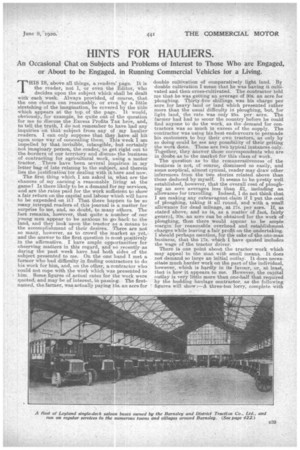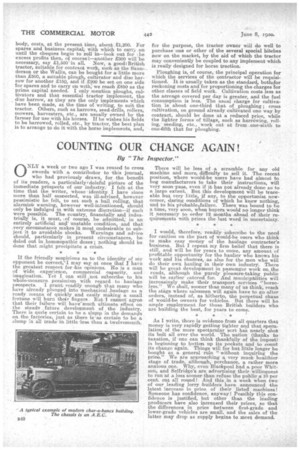HINTS FOR HAULIERS.
Page 25

Page 26

If you've noticed an error in this article please click here to report it so we can fix it.
An Occasional Chat on Subjects and Problems of Interest to Those Who are Engaged, or About to be Engaged, in Running Commercial Vehicles for a Living.
THIS IS, above all things, a readers' page. It is the reader, not I, or even the Editor, who decides upon the subject which shall he dealt with each week. Always provided, of course, that the one chosen can reasonably, or even by a. little stretching of the imagination, be covered by the title which appears at the top. of the page. It would, obviously, for example, be quite out of the question for me to discuss the Excess Profits Tax here, and, to tell the truth, I do not remember to have had any inquiries on that subject from any of my haulier readers. I can only suppose that they have all hit upon some way of concealing them. This week I am impelled by that invisible, intangible, but certainly not imaginary person, the reader' to get right out to the borders of our territory and discuss the business of contracting for agricultural work, using a motor tractor. There have been several inquiries in my letter bag of late relating to the subject, and therein lies the justification for dealing with it here and now.
The first thing which_ I am asked is, what are the chances of my earning a. reasonable living at the game? Is there likely to be a demand for my services, and are the rates paid for the work sufficient to show a fair return on the capital and labour which will have to be expended on it? That there happen to be so ninny intrepid readers of this journal is a matter for surprise To me, and, no doubt, to many others. The fact remains, however' that quite a, number of our young men appear to be anxious to go back to the land, and they look upon the tractor as a means to the accomplishment of their desires. There are not so many, however, as to crowd the market as yet, . and the answer to the first question is most positively in the affirmative. I have ample opportunities for observing matters in this regard, and so recently as during the past week have had both sides of the subject presented to me. On the one hand I met a farmer who had difficulty in finding contractors to do his work for him, and, on the other, a contractor who could not cope with the work which was presented to him. Some figures of actual rates for the work were quoted, and may be of interest, in passing. The firstnamed, the farmer, was actually paying 15s. an acre for double cultivation of comparatively light land. By double cultivation I mean that he was having it cultivated and then cross-cultivated. The contractor told me that he was getting an average of 30s. an acre for ploughing. Thirty-five shillings was his charge per acre for heavy land or land which presented rather more than the usual difficulty in ploughing, but, for light land, the rate was only 25s. per acre. The farmer had had to scour the country before he could find anyone to do the work, as the demand for contractors was so much in excess of the supply. The contractor was using his best endeavours to persuade his customers to buy their own tractors, as only by so doing could he see any possibility of their getting the work done. These are two typical instances only. Together, they answer those correspondents who are in doubt as to the market for this class of work.
The question as to the remunerativeness of the business is not, of course, dismissed so easily, and some sceptical, almost cynical, reader may draw other inferences from the two stories related above than those deduced by myself. It seems to be pretty well established, however, that the overall cost of ploughing an acre averages less than £1, including an allowance for travelling. Indeed, I do not think that I aim making any extravagant claim if I put the cost of ploughing, taking it all round, and with a, small allowance for dead mileage, at 17s. per acre. If, as stated above; and as is, as a matter of fact, fairly general, 30s. an acre can be obtained for the work of ploughing, then there would appear to be ample margin for reasonable overhead and establishment charges -while leaving a fair profit on the undertaking. I should perhaps mention, for the sake of the one-man business, that the 17s. which I have quoted includes the wage of the tractor driver. There is one point about the tractor work which may appeal to the man with small means. It does not demand so large an initial outlay. It does necessitate much harder work on the part of the individual, however, which is hardly in its favour, or, at least, that is hew it appears to me. However, the capital outlay is very little more than one-half that required by the budding haulage contractor, as the following figures will show:—A three-ton lorry, complete with
body, costs, at the present time, about. £1,200. For spares• and business capital, with which to carry, on until the cheques begin to roll in—look out for he excess profits then, ef course l—another .2300 will be necessary, say 21,500 in all. Now, a goodi British tractor, suitable for contract work, such as the Saun demon or the Wallis, can be bought for a little more than 2500, a suitable plough, cultivator and disc har row for another 2150, and if 2200 be set on one side Tor spares and to carry on with; we reach 2850 as the prime capital needed. I only mention ploughs, cul tivators and that essential tractor implement, the disc harrow, as they are the only implements which have been made, at the time of writing, to suit the tractor. Others, such as harrows, seed-drills, rollers mowers, harvesters, etc., are usually owned by the farmer for use with his horses. If he wishes his field to be harrowed, rolled, etc., by tractor, the best plan is to arrange to do it with the horse implements, and
tor the purpose, the tractor owner will do well to purchase one or other of the several special hitches DOW on the market, by the aid of which the tractor may conveniently be coupled to any implement which is really designed for horse traction.
Ploughing is, of course, the principal operation for which the services of the contractor will be requisitioned. It is usually taken as the standard, hothsfor reckoning costs and for proportioning the charges for other classes of field work. Cultivation costs less as the acreage covered per day is greater, and the fuel consumption is less. The usual charge for cultivation is about one-third that of ploughing; cross cultivation on ground already cultivated one way by contract, should be done at a reduced price, while the lighter forms of tillage, such as harrowing, rolling,seeding, etc., work out at from one-sixth to one-fifth that for ploughing.




























